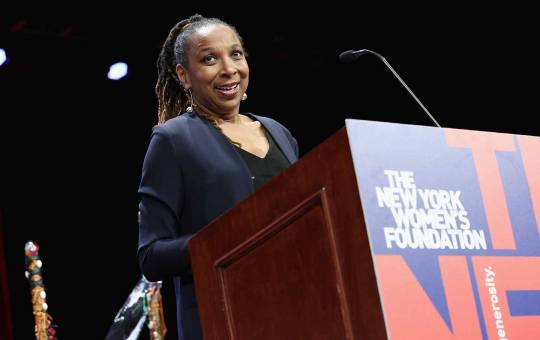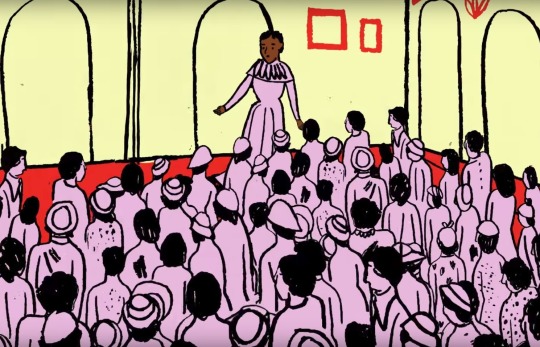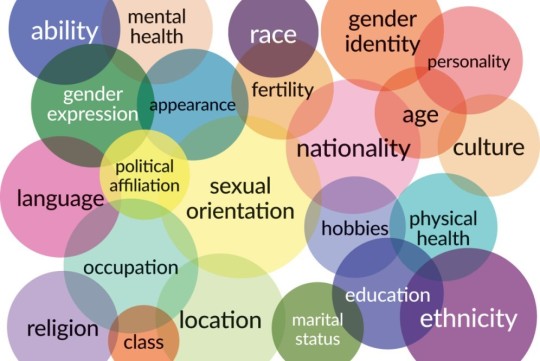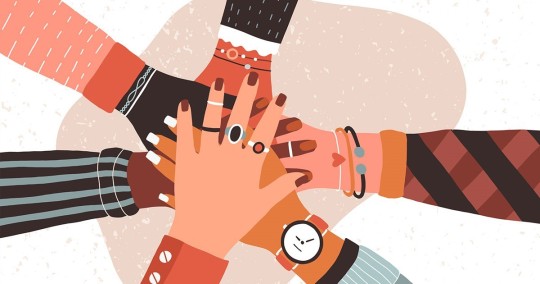Text
A little bit of personal history
Kimberlé Crenshaw is a prominent legal scholar, professor, and founder of the African American Policy Forum. She was born in Canton, Ohio, on May 5 1959 to Marian and Walter Clarence Crenshaw. Her parents encouraged her from a young age to discuss "interesting things" that she "observed in the world that day" which later became the foundation of her career.
Crenshaw attended Canton McKinley High School before pursuing higher education at Cornell University, where she earned a bachelor's degree in Government and Africana studies in 1981. She then earned a J.D. from Harvard Law School in 1984, where she was a member of the Harvard Law Review. In 1985 she completed an LL.M. from the University of Wisconsin Law School, where she also served as a law clerk to Wisconsin Supreme Court Judge Shirley Abrahamson.
Following the completion of her L.L.M., Crenshaw joined the faculty of the University of California, Los Angeles School of Law in 1986, where she has been teaching ever since. She is widely recognized as a founder of the field of critical race theory, and her academic work focuses on civil rights, critical race studies and constitutional law. At UCLA she teaches several courses, including Advanced Critical Race Theory, Civil Rights, Intersectional Perspectives on Race, Gender and the Criminalization of Women & Girls and Race, Law and Representation. She has been recognized by her students for her exceptional teaching abilities, having been elected professor of the year by matriculating students in both 1991 and 1994.
In 1995, Crenshaw was appointed a full professor at Columbia Law School, where she also founded and directs the Centre for Intersectionality & Social Policy Studies, established in 2011. Her courses at Columbia include a Intersectionalities Workshop centred around Civil Rights.

Throughout her career, Crenshaw has been actively involved in promoting equality and justice. In 1991, she assisted the legal team representing Anita Hill at the U.S. Senate confirmation hearings for Supreme Court Justice Clarence Thomas. In 1996, she co-founded the African American Policy Forum (AAPF), a think tank focused on "dismantling structural inequality" and "advancing and expanding racial justice, gender equality, and the indivisibility of all human rights, both in the U.S. and internationally." The organization's mission is to bridge the gap between academic research and public discourse in addressing inequality and discrimination.
Crenshaw has received numerous awards and honours for her work, including the Fulbright Chair for Latin America in Brazil, and in 2008, she was awarded an in-residence fellowship at the Centre of Advanced Behavioural Studies at Stanford. She has also written several books and articles, including "Mapping the Margins: Intersectionality, Identity Politics, and Violence against Women of Colour," which has become a widely-cited and influential piece in the field of critical race theory. Her next book, "The Race Track: How the Myth of Equal Opportunity Defeats Racial Justice," co-authored with Luke Charles Harris and George Lipsitz, will be published in December 2025.
In addition to her academic work, Crenshaw has also been involved in various public service roles. She wrote the background paper on Race and Gender Discrimination for the United Nations World Conference on Racism in 2001, helped to facilitate the addition of gender in the WCAR Conference Declaration and served as a member of the National Research Council panel on Research on Violence Against Women.
Sources used (in order):
1 note
·
View note
Text
youtube
This is Kimberlé Crenshaw, the woman who defined the concept of intersectionality and helped bring to the public's awareness how discrimination compounds and affects different groups.
‘’Kimberlé W. Crenshaw is a pioneering scholar and writer on civil rights, critical race theory, Black feminist legal theory, and race, racism and the law. In addition to her position at Columbia Law School, she is a Distinguished Professor of Law at the University of California, Los Angeles.’’ Says Colombia law School article ( https://www.law.columbia.edu/faculty/kimberle-w-crenshaw )
💥Crenshaw was the one to provide the following definition of intersectionality: "Intersectionality is a metaphor for understanding the ways that multiple forms of inequality or disadvantage sometimes compound themselves and create obstacles that often are not understood among conventional ways of thinking."💥
Here are 5 amazing things Kimberlé did throughout her life to support and inspire young generations :
1. Coined the term "intersectionality": Crenshaw is credited with coining the term "intersectionality" in her 1989 paper, "Demarginalizing the Intersection of Race and Sex: A Black Feminist Critique of Antidiscrimination Doctrine, Feminist Theory and Antiracist Politics." In this paper, Crenshaw argued that the experiences of black women are not adequately represented in either feminist or anti-racist discourses, and that these experiences are shaped by the intersection of race and gender.
2. Founded the African American Policy Forum (AAPF): Crenshaw co-founded the AAPF in 1996, a think tank that aims to advance social justice by promoting progressive policies that address structural inequality. The organization focuses on issues such as reproductive rights, criminal justice reform, and racial and gender equity.
3. Advocated for the inclusion of black women in anti-discrimination laws: Crenshaw has been a strong advocate for the inclusion of black women in anti-discrimination laws. Her work has helped to highlight the ways in which black women experience discrimination that is both racial and gendered in nature, and has paved the way for legal protections that take this intersectionality into account.
4. Served as a professor at several prestigious universities: Crenshaw has taught at several prestigious universities, including UCLA, Columbia Law School, and Harvard Law School. She is currently a professor of law at UCLA and the executive director of the African American Policy Forum.
5. Won numerous awards for her contributions to scholarship and activism: Crenshaw has been recognized for her contributions to scholarship and activism with numerous awards, including the Fulbright, Rockefeller, and Ford Foundation Fellowships, and the Harvard Law School's Medal of Freedom. She was also named one of Time Magazine's 100 Most Influential People in the World in 2020.
In the end, we present you some interesting articles that we think you would absolutely love! Here are the articles and also a short description of them:
1. "The Urgency of Intersectionality" by Kimberlé Crenshaw: In this article, Crenshaw explains the concept of intersectionality and its importance in understanding the experiences of individuals who face multiple forms of discrimination. She argues that intersectionality is essential for creating effective social justice movements.
2. "Kimberlé Crenshaw on Intersectionality, More than Two Decades Later" by Maya Dusenbery: This article, published in Feministing, provides an overview of Crenshaw's work on intersectionality and highlights some of her recent efforts to apply this framework to contemporary issues such as police brutality and the #MeToo movement.
3. "Kimberlé Crenshaw: The Woman Who Coined the Term 'Intersectionality'" by Amna Saleem: This article, published in The Guardian, profiles Crenshaw and her impact on the field of critical race theory. It also discusses some of the criticisms that have been leveled against her work.
4. "Kimberlé Crenshaw: What Is Intersectionality, and Why Do We Need It?" by Robin DiAngelo: In this article, published in the Harvard Gazette, Crenshaw discusses her background and the origins of the concept of intersectionality. She also explains how intersectionality can be used to address systemic inequality.
Sources used:
1. Crenshaw, K. (1989). Demarginalizing the Intersection of Race and Sex: A Black Feminist Critique of Antidiscrimination Doctrine, Feminist Theory and Antiracist Politics. University of Chicago Legal Forum, 139-167.
2. African American Policy Forum. (n.d.). About AAPF. Retrieved from:
3. Crenshaw, K. (1991). Mapping the Margins: Intersectionality, Identity Politics, and Violence against Women of Color. Stanford Law Review, 43(6), 1241-1299.
4. UCLA School of Law. (n.d.). Kimberlé Crenshaw. Retrieved from:
5. Time. (2020). Kimberlé Crenshaw. Retrieved from https://time.com/collection/100-most-influential-people-2020/5888304/kimberle-crenshaw/
#kimberlé crenshaw#intersectionality#historical intersectionality#anti discrimination#feminism#video#youtube#weekly/chrono
1 note
·
View note
Text
Introductory Post
Hey there!
✨️Welcome to our Tumblr blog!✨️
The purpose of this blog is to talk about the concept of historical intersectionality and how it has shaped the experiences of marginalized groups throughout history.
Intersectionality is a term that has gained a lot of popularity in recent years, but its roots can be traced back to the early 19th century black feminist movement. It recognizes that our different social identities - such as race, gender, class and sexuality - interact in complex and interconnected ways to shape our experiences and opportunities in society.
Historical intersectionality recognizes that these social identities have not existed in isolation, but rather have been deeply intertwined throughout history.

✨️But what actually IS intersectionality?✨️
Intersectionality is a way of understanding social relations by examining intersecting forms of discrimination. This means acknowledging that social systems are complicated and that many forms of oppression like racism, sexism and ageism might be present and active at the same time in a person’s life.
Everyday approaches to building equality tend to focus on one type of discrimination – for instance sexism – and then work to address only that specific concern. But while the career of a young, white and able bodied woman might improve with gender equality protections, an older, black, disabled lesbian may continue to be hampered by racism, ageism and homophobia in the workplace. Intersectionality is about understanding and addressing all potential roadblocks to an individual or group’s well-being. But it’s not as simple as just adding up oppressions and addressing each one individually. Racism, sexism and ableism exist on their own. But when combined, they compound and transform the experience of oppression. Intersectionality acknowledges that unique oppressions exist, but is also dedicated to understanding how they change in combination.

The roots of intersectionality lie within the black feminist movement, with legal scholar Kimberlé Crenshaw originating the term. Crenshaw felt that anti-racist and feminist movements were both overlooking the unique challenges faced by black women. She stated that legislation about race is framed to protect black men, and legislation about sexism is understood to protect white women. So simply combining racism and sexism together does not therefore protect black women.
Intersectional theory is now applied across a range of social divisions and also to understandings of domination such as those associated with whiteness, masculinity and heterosexuality. Intersectionality is not only about multiple identities, and it’s not a simple answer to solving problems around equality and diversity. It is, however, an essential framework as we truly engage with issues around privilege and power, and work to bring them into the open. Intersectionality means listening to others, examining our own privileges, and asking questions about who may be excluded or adversely affected by our work. As importantly, it means taking measurable action to invite, include and centre the voices and work of marginalised individuals.
✨️HOW is intersectionality still relevant today?✨️
Intersectionality is an important concept in the fight for social justice today. It recognizes that our identities cannot be separated from one another, and that our experiences are shaped by a complex array of factors. By understanding historical intersectionality, we can better understand the ways in which oppression and privilege have operated throughout history, and work towards a more just and equitable society for all.
Intersectionality is still very relevant today as it provides a framework for understanding how different forms of discrimination and oppression can intersect and impact individuals and communities.
One of the key ways in which intersectionality is relevant today is in the fight for social justice and equality. By recognizing that people may experience discrimination and oppression in multiple ways, intersectionality helps advocates and politicians to develop more inclusive policies and practices that address the complex and interrelated forms of oppression that people may face.
Intersectionality is also relevant in areas such as education, healthcare, and employment, where individuals from marginalized groups may face barriers to accessing services or opportunities due to their intersecting identities. By taking an intersectional approach, organizations can identify and address these barriers more effectively, leading to greater equity and inclusion.

Overall, intersectionality remains an important concept for understanding and addressing the various forms of discrimination and oppression that exist in society today. Throughout the next few months we will explore all of it's facets and discuss it's more in-depth aspects.
Here are the Sources used:
#black history month#feminism#history#intersectionality#historical intersectionality#kimberlé crenshaw#summary#intro post#weekly/chrono
1 note
·
View note